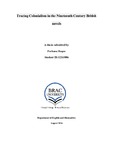| dc.contributor.advisor | Ahmed, Nawshaba | |
| dc.contributor.author | Haque, Farhana | |
| dc.date.accessioned | 2017-04-05T04:51:52Z | |
| dc.date.available | 2017-04-05T04:51:52Z | |
| dc.date.copyright | 2016 | |
| dc.date.issued | 2016-08 | |
| dc.identifier.other | ID 12263006 | |
| dc.identifier.uri | http://hdl.handle.net/10361/7996 | |
| dc.description | This thesis is submitted in partial fulfillment of the requirements for the degree of Masters of Arts in English, 2016. | en_US |
| dc.description | Cataloged from PDF version of thesis. | |
| dc.description | Includes bibliographical references (page 49-50). | |
| dc.description.abstract | The aim of this paper is to map out aspects of colonialism and embedded colonial spirit in the works of the Nineteenth century British novelists. To do so I have chosen three quintessential English novels, Jane Austen’s Mansfield Park (1814), Charlotte Bronte’s Jane Eyre (1847), and its prequel Wide Sargasso Sea (1966) written by Jean Rhys. These three novels from three different eras, the Romantic period, the Victorian period and the Postcolonial modern times illustrate how literature can often be ingrained with supremacist ideologies and in turn can also be the means of resistance against the forces of Colonialism. For example, in the novels Jane Eyre and Mansfield Park we see how the identity of the Colonizer is created with the help of the colonial money and how English imperial identity relied on the property earned through the means of slave trade in the Caribbean Islands. If we trace the history of British imperialism we see the expansion of British colonies were parallel with the British concern for a national identity, arising mostly in the Eighteenth Century. With the colonization of the Caribbean Islands and other subsequent British satellites, identity within the British Empire became even more complex. This reinforced the need for a distinction to be made between the multicultural, colonized British subjects and the racially, culturally and religiously homogenous Britons who possessed the coveted “Englishness”. Such idea of English superiority found its voice in the narratives of English novels, especially in those which were written during the Romantic and the Victorian period, primetime for the British imperial conquest. Given my aim of tracing colonial predisposition and resistance in/ through literature I have designed my paper into three chapters, each examining one novel. Chapter One will examine Bronte’s Jane Eyre, Chapter Two will shed further lights on this novel along with its post colonial counterpart, Jean Rhy’s Wide Sargasso Sea. These chapters will analyses the cultural hierarchies present in both texts and explore the contested nature and meaning of ‘Englishness’ throughout the narrative of the colonizer (Jane Eyre) and the colonized body (Wide Sargasso Sea). While Bronte’s text constructs a definition of Englishness by juxtaposing English characters against the colonial other, Rhy’s text fights against Bronte’s cultural hierarchy while simultaneously colluding with the colonial project. The Third chapter of my paper will analyses Mansfield Park which will take my discussion further on the issues of identity earned by slave trade. This study will discern how the colonial projects can be occupied by the English novels, informs authorial choices and complicates past readings. | en_US |
| dc.description.statementofresponsibility | Farhana Haque | |
| dc.format.extent | 50 pages | |
| dc.language.iso | en | en_US |
| dc.publisher | BRAC University | en_US |
| dc.rights | BRAC University thesis are protected by copyright. They may be viewed from this source for any purpose, but reproduction or distribution in any format is prohibited without written permission. | |
| dc.subject | British novels | en_US |
| dc.subject | Jane Eyre | en_US |
| dc.subject | Bertha Mason | en_US |
| dc.title | Tracingcolonialism in the nineteenth century British novels | en_US |
| dc.type | Thesis | en_US |
| dc.contributor.department | Department of English and Humanities, BRAC University | |
| dc.description.degree | M.A. in English | |

